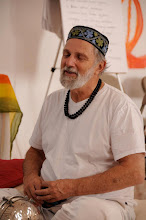For years I have been fascinated with the stories of Joseph and his brothers in the last section of Genesis, and even wrote out a little booklet about it. The mystics see Joseph and Tamar as the biblical male and female personifications of the infinite depth (sefirah) of Yesod, the Foundation, the illumined sage, one of ten fruits on the Tree of Life, which may explain why Tamar’s story in Genesis appears right in the midst of the Joseph tales.
Early commentators say Tamar is the daughter of Shem, son of Noah, who
lived 600 years before and after the flood and even became Mechizedek,
high priest of God who blessed Abraham after he rescued Lot and everyone
else at that time.
Tamar and Judah are destined to be the
partners and parents of the Davidic lineage, and Tamar seems to know it.
Judah was one of the cruel ringleaders in getting rid of Joseph, the
favored son with the portentious dreams. But when he saw the terrible
grief his father was experiencing over the death of his 17 year-old son
with the amazing aura (coat of many colors, even before his father gave
him the jacket), Judah moved away, married and had three sons, two of
whom died before his eyes, which was his karma on seeing his father’s
grief over the loss of a child.
Judah was in line to become the top
banana after Joseph’s disappearance and apparent death. He had the robe
and the bowl of our lineage, which after his wife died he gave to Tamar,
disguised then as a fertility prostitute before the sheep shearing.
(This is our lineage: Abraham, Isaac, Jacob and Tamar.) But Tamar brings
Judah around. “She is more righteous than I,” he declares, and they
never stopped knowing and loving each other after that (according to a
translation of the Hebrew Reb Zalman Schachter told me).
Tamar gets Judah to do t’shuvah (repent, return) which prepares him later to offer himself in slavery to the Egyptian Prime Minister to save Benjamin’s life. According to the Q’ran, not
just Judah but each brother comes forward and offers himself in slavery
to save Benjamin, the next “favorite” son, but this time they redeemed
themselves completely, which is why Joseph never revealed himself
earlier either to them or to his father; he saves their souls.
When he was young, like you and me, Joseph sensed he was blessed,
gifted, special and even set himself above his brothers who were not so
obviously gifted. He was not yet mature enough not to set himself above
others. That humility and maturity came to him in slavery and prison.
But this week he reveals himself and tells his brothers, don’t blame
yourselves. It was God who who brought me here to save many lives, to
feed all the people and the nations all around during this famine; it’s
all God’s doling. Yes, cream rises.
When Joseph was in the pit, early commentators says
Ruben came back during the night with a donkey and a rope to rescue his
little brother, but Joseph told him, no, this is my fate and I have to
go with it, and Ruben despaired.
This is just to give you another hit on these amazing Joseph stories.

